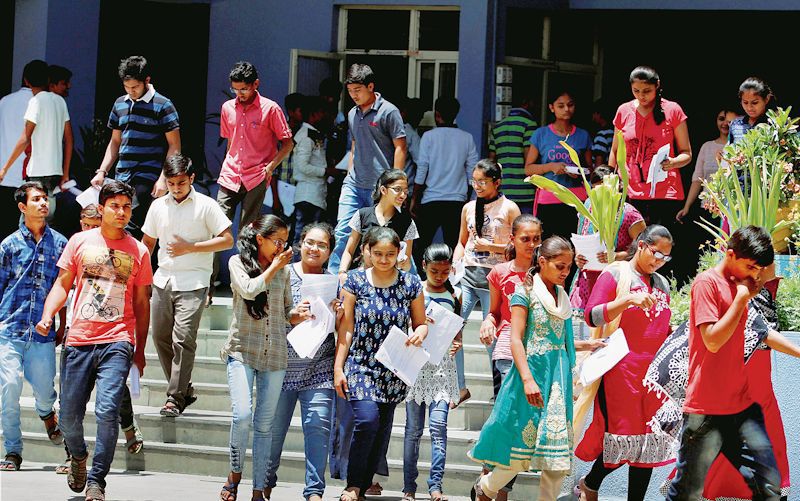
Rat race: Nothing is more tragic than to lose one’s unique talent and aptitude in the name of treading the path followed by ‘successful’ students. PTI
Sociologist
FOR quite some time, I have been witnessing the transformation of a young student I am deeply attached to. There was a time when he was playful. From cycling to football, or from reading good literature to writing reflexive essays and short stories — he was filled with abundant creative energy. However, these days, it seems, he remains perpetually tense, fearful and discontented. He recently appeared in the Class XII board examinations. Yet, there is no relief. He is worried because he could not answer a five-mark question in the physics paper. He is worried because he is not very sure whether he would be able to get at least 97 per cent marks in the exam. And moreover, the anxiety over a series of standardised tests — JEE, NEET, CUET — he has to confront to prove his ‘worth’ seems to have taken away his laughter, his lightness, his sleep and his life energy.
However, this is not just his story. If you move around, converse with young students and listen to the tales of their everyday struggle — from schools to coaching centres — you are bound to feel that a toxic culture of education is destroying our children, robbing them of their joy and curiosity, and creating a restless/unhappy generation.
Why do I say that what this generation is receiving in the name of education is toxic? There are four reasons. First, the excessive importance it attaches to tests and exams diminishes the joy of learning. While a meaningful culture of engaged learning demands a reasonably relaxed social and pedagogic environment for self-exploration and inner growth on the basis of one’s unique aptitude and skills, the reckless pressure to judge, rank and quantify one’s ‘knowledge’ of physics, mathematics or English through the never-ending cycle of weekly/monthly/yearly tests, or the chain of hugely problematic standardised tests disturbs the rhythm of learning, and causes stress, fear and chronic mental agony. Second, it disturbs the rhythm of social connectivity and the spirit of collaborative and dialogic learning. Instead, the virus of hyper-competitiveness and associated traits of envy, loneliness and selfishness pollute the mental landscape of young students. Because of this culture of education, it becomes exceedingly difficult for our children to learn the civic virtues that a healthy/democratic society needs to sustain itself — humility, empathy and the art of collective elevation through dialogue, cooperation and the ethic of care. Third, as it is obsessed with ‘success stories’ (imagine the instant ‘stardom’ that transforms the ‘toppers’ of board exams or much-hyped tests like NEET and JEE into some sort of mythological figures), it invariably manufactures the tales of ‘failures’ amid these shining ‘stars’.
Yes, every year, we are compelling thousands of youngsters to believe that they are good for nothing since they cannot crack these tests, and thereby incapable of becoming doctors and engineers; we are forcing them to live with stigma, low self-esteem, wounded selves and suicidal tendencies. And fourth, this culture of education is toxic because it is one-dimensional. As purely instrumental reasoning is celebrated, and a high-paid job in the techno-corporate empire tends to become the only purpose of being ‘educated’ and ‘meritorious’, what we witness is the systematic erosion of the dignity of other forms of work. Furthermore, it devalues the ethos of humanistic education. Possibly, policymakers and academic managers who run the show are planning to nurture a generation specialised in, for example, robotics and artificial intelligence, but utterly indifferent to the treasure of great poetry, literature and spiritual/philosophic texts that seeks to awaken our souls, and take us from darkness to light, or from egotism to altruism. Indeed, here is a generation technically skilled but morally impoverished. This is the ultimate irony.
I am not very sure whether it will ever be possible to save our children from this toxic culture. Yet, with the ‘optimism of the will’, we — as teachers and parents — need to raise our voice and create a new discourse on education. It is important for those who still love the vocation of teaching to assert the importance of libertarian education or the ethos of a democratic classroom. Unless we as teachers stand up, work on ourselves, play the role of self-confident/awakened educators and public intellectuals — neither cogs in a bureaucratic machine nor passive followers of the policies formulated by a set of techno-managers and corporate elites who are completely detached from the world of children or the dynamics of teaching as well as learning — and initiate a movement for saving education, there is no hope. Likewise, it is important on the part of the parents to realise and appreciate the fact that every child is unique, and there is no uniform, measurable and standardised notion of ‘merit’ or ‘intelligence’. There is nothing unnatural if your child does not like science; it is not her fault if she hates tests like the ‘Mathematics Olympiad’. An empathic understanding of her inner world might enable you to realise that she is possibly endowed with yet another kind of talent or merit — say, in painting, music, farming, or even social work. When do we realise that there are moral limits of markets, and there is nothing wrong if our children remain happy even in relatively low-paid jobs which are in tune with their unique aptitude?
Nothing is more tragic in life than to lose one’s unique talent and aptitude in the name of treading the path followed by ‘successful’ students in the neurotic rat race that the toxic culture of education has normalised.
Join Whatsapp Channel of The Tribune for latest updates.



























